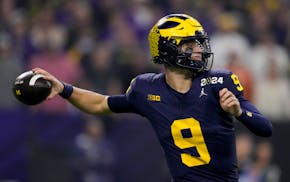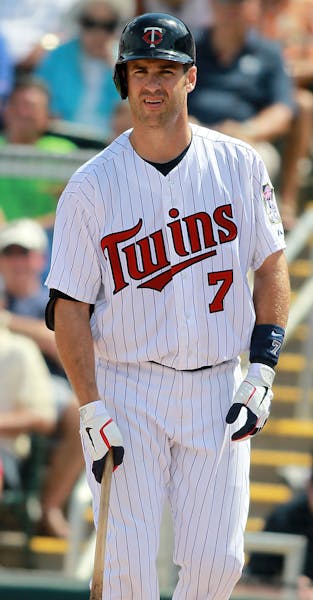Player A might be the most popular athlete in Minnesota history.
He shot through the Twins' farm system and became a big part of winning teams. After his agent, Ron Shapiro, battled the Twins in contract negotiations, he became, briefly, the highest-paid player in baseball by signing a deal to keep him in Minnesota at least through his prime.
In his first 10 seasons in the majors, he produced an OPS (on-base-plus-slugging percentage) of .827 and a WAR (overall player rating, called wins above replacement player) of 44.0. He made the All-Star team eight times, won six Gold Gloves and five Silver Sluggers and ranked in the top 10 in MVP votes seven times.
He was not a classic power hitter, instead spraying line drives all over the ballpark. He was beloved.
Player B is not the most popular athlete in Minnesota history, even though he grew up in the state.
He shot through the Twins' farm system and became a big part of winning teams. After his agent, Ron Shapiro, battled the Twins in contract negotiations, he signed the most lucrative contract in franchise history, a deal expected to keep him in Minnesota at least through his prime.
In his first 10 seasons in the majors, he produced an OPS of .873 and a WAR of 44.3. He made the All-Star team six times, won one MVP Award, finished in the top 10 of MVP voting four times, won three Gold Gloves and five Silver Sluggers, all despite having two of his first 10 seasons wiped out by injuries.
He was not a classic power hitter, instead spraying line drives all over the ballpark. He was not beloved, at least not among the chattering classes that use social media.
Player A was Kirby Puckett. Player B is Joe Mauer. Through the first 10 years of their careers, they proved to be remarkably similar. They are perceived to be altogether different.
Why?
Mauer might have been slightly more valuable than Puckett over his first 10 big-league seasons, because he played a more difficult defensive position — catcher instead of center and right field — and because he reached base more often. In fact, while Puckett was perceived to have more power, and did hit more home runs on average, Puckett's slugging percentage his first 10 years was .469. Mauer's is .468.
As public figures, Puckett still benefits from three factors:
1) Puckett played more.
He was incredibly durable. Puckett prided himself on playing every day. He never visited the disabled list, while Mauer has had two seasons ruined by injury and was rested regularly even when healthy, as are most modern-day catchers.
2) Puckett was charismatic.
He played with great joy and more obvious effort, while Mauer showed off smooth mechanics. As a center fielder, Puckett could make the spectacular play, running into or leaping above a wall, while Mauer toiled in a crouch.
3. Puckett won championships, and shined while doing so.
Puckett made the playoffs only twice, but both trips turned into World Series titles, with his Game 6 performance in the 1991 World Series branding him as a clutch performer, a winner for the ages. Mauer's teams made the playoffs four times — five if you count Game 163 in 2008 — but he never has played in a winning playoff game (the Twins won a game in 2004 when Mauer was injured), much less a series. If Game 6 of 1991 stands as Puckett's postseason symbol, Mauer's is the potentially game-changing double he hit in 2009 that was incorrectly ruled foul in Yankee Stadium.
During his 10th season, Puckett moved from a prime defensive position, center field, to right. After his 10th season, Mauer was shifted from a prime defensive position, catcher, to first base.
The Twins moved Puckett because he had lost a step. They moved Mauer because of concussions and other injuries that kept him out of the lineup. Puckett remained a productive hitter before his career prematurely ended in the spring of 1996.
Perhaps the best way to compare the two, regardless of perception and postseason experience, is this:
Puckett was a borderline Hall of Fame player who made it on the first ballot in part because of his status as a beloved ambassador of the game whose career ended prematurely.
If Mauer remains healthy, he will be a first-ballot Hall of Fame selection for no reason other than statistical merit.
Jim Souhan can be heard weekdays at noon and Sundays from 10 to noon on 1500 ESPN. His Twitter name is @SouhanStrib. • jsouhan@startribune.com

Souhan: Wolves fans made Game 1 special. Now bring on Game 2.

Souhan: Should Vikings even consider McCarthy in NFL draft?

Souhan: NAW erases Suns' lead, Game 1 advantage with big performance

Souhan: This is KAT's chance to prove Flip Saunders was right


